Rollin’ & Tumblin’
Rollin’ & Tumblin’
In January 1928, Memphis-based Cannon’s Jug Stompers recorded “Minglewood Blues” for Victor Records. This creaky-sounding jug band arrangement featured Gus Cannon on banjo and jug, Ashley Thompson on guitar and vocal, and harmonica ace Noah Lewis, who was credited with writing the song. This is the first recording to feature the “Rollin’ and Tumblin’” melody.
Rollin’ & Tumblin’
Gus Cannon (September 12, 1883 – October 15, 1979) helped to popularize jug bands in the 1920s and 1930s. Cannon began recording, as "Banjo Joe", for Paramount Records in 1927. At that session he was backed up by Blind Blake. After the success of the Memphis Jug Band's first records, he quickly assembled a jug band.
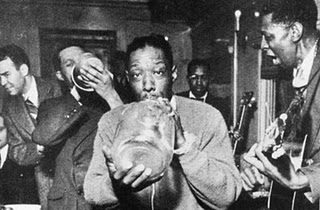
Gus Cannon Plays Jug
Cannon's Jug Stompers first recorded at the Memphis Auditorium for the Victor label in January 1928. Although their last recordings were made in 1930, Cannon's Jug Stompers were one of Beale Street's most popular jug bands through the 1930s. In the "blues revival" of the 1960s, Gus Cannon made some college and coffee house appearances with Furry Lewis and Bukka White.
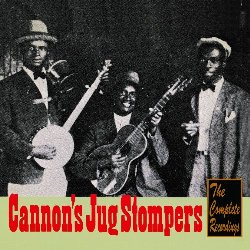
Cannon's Jug Stompers
Considered as a traditional, Rollin’ and Tumblin’ has been recorded with different lyrics and titles. Authorship is most often attributed to Hambone Willie Newbern or Muddy Waters.
Hambone Willie Newbern (1899 – 1947) was a country blues musician. He was reported to have played with Yank Rachell and Sleepy John Estes (from whom most of our knowledge of Hambone was gained) in the 1920s and 1930s. Newbern made his recording in March 1929, when a field unit for OKeh Records set up shop in Atlanta, Georgia. Playing with fingers and slide on a guitar tuned to an open-G chord, Newbern framed his “Roll and Tumble Blues” as a dance tune.
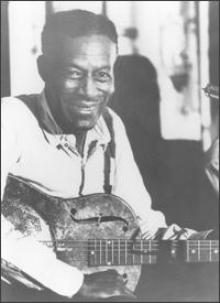
Hambone Willie Newbern
By the mid 1930s, “Rollin’ and Tumblin’” was a staple at Southern house parties, fish fries, and juke joints, where its simple melody could be easily played on guitar, fiddle, harmonica, mandolin, piano, and other instruments. It was especially popular in the Mississippi. Robert Johnson certainly knew the song. At his 1936 session in San Antonio, he revitalized it as “If I Had Possession Over Judgment Day,” climaxing his jacked-up arrangement with stratospheric slide.
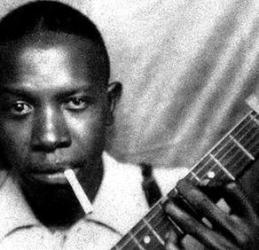
Robert Johnson
The best known version became Muddy Waters' "Rolling and Tumbling," with Ernest "Big" Crawford on bass, for the Chess brothers' Aristocrat label in 1950. The Parkway label credits the Baby Face Leroy Trio, with vocals by Leroy, and Muddy Waters as the songwriter. Elmore James recorded the song as "Rollin' and Tumblin'" in 1960.
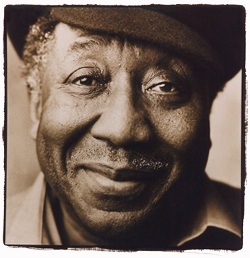
Muddy Waters
The song features a simple, percussion-driven beat, usually with a distinctive slide guitar accompaniment punctuated by harmonica and vocals. The lyrics consist of verses (but no chorus) that have varied over time from artist to artist. The first line is typically "I rolled and I tumbled, I cried the whole night long." The first line of each verse is repeated once, and then followed by a conclusion—the usual three-line structure for a 12-bar blues lyric.
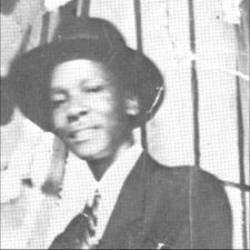
Baby Face Leroy
Since the 1960s the song has been played and recorded by hundreds of blues-rock bands. Cream blasted a mighty version on 1966’s Fresh Cream. The Yardbirds, with young Jimmy Page on guitar, sped up the song and renamed it “Drinking Muddy Water.” Playing for the BBC, Jimi Hendrix quoted it in “Catfish Blues.” On film, Canned Heat cranked it up at the Monterey Pop Festival. Johnny Winter played it on 1968’s The Progressive Blues Experiment and would re-record it later in his career.
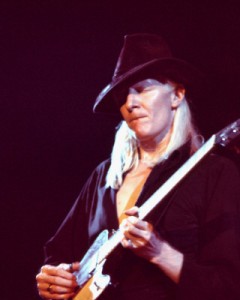
Johnny Winter
The Grateful Dead paid homage to Noah Lewis’ old “New Minglewood Blues” 78 on their first album, although this version does not contain the classic “Rollin’ and Tumblin’” riff or melody.
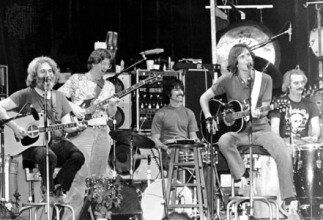
Grateful Dead
“Rollin’ and Tumblin’” continues to hold its place among blues and rock performers. It’s been reinterpreted and recorded countless times and performed everywhere from country back porches to Carnegie Hall. And notable versions keep coming: Eric Clapton, for instance, framed the song for acoustic slide and handclaps on 1992’s Unplugged album, electrified it for the Cream reunion projects, and returned to the Robert Johnson version, “If I Had Possession Over Judgment Day.”

Cream
During a 1990 field trip, Jan Obrecht, writer, visited R.L. Burnside at his home outside of Holly Springs, Mississippi. He wrote: “At least a dozen of his children and grandchildren were gathered under a tree. R.L.’s teenaged son Dwayne saw my old Silvertone acoustic and asked if he could try it. Thumbing a shuffling rhythm, he began playing – you guessed it – ‘Rollin’ and Tumblin’. All of the younger children instantly locked in to what he was doing, as if it the song was encoded into their DNA. They began dancing, clapping, and chanting along, a joyous celebration of a transcendent song both ancient and modern. I have high hope that “Rollin’ and Tumblin’” will continue to be passed down from one generation to the next.”
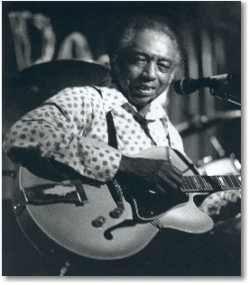
R.L. Burnside
Muddy Waters - Rollin And Tumblin lyrics
Well, I rolled and I tumbled, cried the whole night long Well, I rolled and I tumbled, cried the whole night long Well, I woke up this mornin', didn't know right from wrong Well, I told my baby, before I left that town Well, I told my baby, before I left that town Well, don't you let nobody, tear my barrelhouse down Well, ahh, mmm-hmmm, owww, oww ooo, aww, oww, oh Aaa, mmm-hmmm, oww, oh oh oh owww, oww ooo, aww, oww, oh Well, if the river was whiskey, and I was a divin' duck Well, if the river was whiskey, and I was a divin' duck Well, I would dive to the bottom, never would I come up Well, I could a had a religion, this bad old thing instead Well, I could a had a religion, this bad old thing instead Well, all whiskey and women, would not let me pray
Last Updated (Wednesday, 18 March 2015 14:46)








